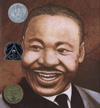Musing on Martin’s Big Words
January 12, 2003
got loads of cleaning and organizing done, though no real
writing. looking for some kind of small magnetic board for the office,
but all i seem able to find are big magnetic white boards. not exactly
the ideal solution
have been thinking about the MLK lesson plan that i’ve been
working on. letting it simmer mainly. i’m still sort of between feeling
unsure if it’s a useful lesson or just a lesson with a social agenda without
any other real purpose.  i
i
have it has a 3-5 lesson focusing on the Martin’s
Big Words book. have students talk about the notion of ‘big’ words
and then go out to choose their own ‘big’ words. the other alternative
is to give them MLK quotes and have them choose ‘big’ words which they
compose into a found poem, or something of that sort. i dunno. maybe it’s
just that the theory section seems so gaggy to me right now:
To talk about Dr. King’s life is to talk about horrible
things: racism, bombings, murders, assassination. Yet it is also to
discuss wonderful things: love, peace, harmony, pride, determination.
What do we tell children about the "bad" things in the world?
How can we "give [them] hope… provide [them] with reasons to
embrace life and its possibilities" (Stanley 41)?Ultimately, Stanley resolves, "Education is the only solution
that I know to these dilemmas. Education, understood not as technique
or training, not as schooling, but as part and parcel of ‘the engagement
of being human,’ i.e., the shared act of making meaning of meanings
inherited from others" (41).Following the terrorist attacks of September 11, 2001, the NCTE Executive
Committee issued a statement
that concluded similarly: "We assert that the long-term response
to violence and cruelty — indeed the only truly effective response
— is education, an education in which social justice and the dignity
of all people are held paramount."In this activity, students focus on this kind of educational goals.
Through an exploration of Dr. King’s use of non-violence protest and
the power of words as a weapon for social justice, students learn
more about Dr. King’s life and think about their own impact on the
future. And by turning from King’s words to their own hopes for the
future, the activity makes specifically highlights hope for the future.Further Reading
Stanley, Timothy J. 1999. "A
Letter to My Children: Historical Memory and the Silences of Childhood."
Teaching for a Tolerant World, Grades K-6: Essays and Resources.
Ed. Judith P. Robertson. Urbana: NCTE. Pp. 34-44.
Stanley’s article focuses on talking
to his children about whether Nazis are "bad guys." While
not directly about King or African American history, the piece is
a relevant discussion of the things that we do and do not talk to
children and students about, when we discuss the, how we discuss them,
and why we discuss them.